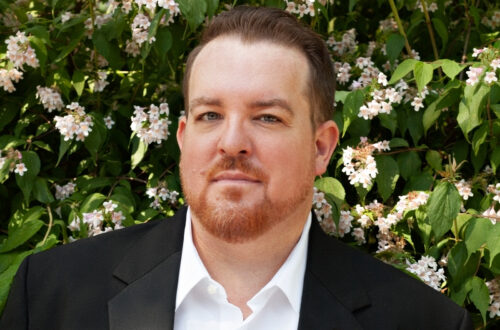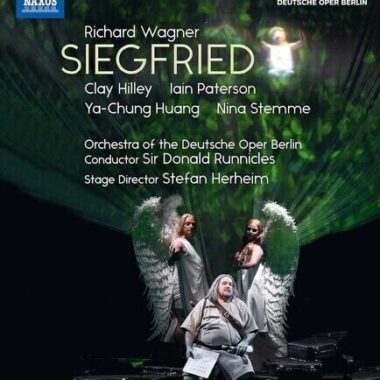
Clay Hilley bringt Kraft und Ausdauer für die mörderische Rolle mit… Die Rom-Erzählung ist nicht nur eine Nagelprobe für den Tannhäuser, sondern für Wagner-Tenöre schlechthin, und die wurde schlechtweg fabelhaft abgeliefert.
Der Opernfreund, Renate Wagner
American heldentenor Clay Hilley was sensational in the title role, which is a notoriously long and difficult sing. His voice is voluminous, yet he never pushes it beyond its limits, producing virile tone throughout the long evening, with plenty in reserve for the taxing ‘Rome Narration’ in the last act.
Music OMH, Keith McDonnell
The most outstanding soloist is – fortunately – the most sought-after. With Clay Hilley, the OSM has found – a rare occurrence – an authentic Wagnerian tenor, who recently sang Tristan in Bayreuth. As Valdemar, the cursed king of the score, the American deploys a voice as velvety as it is virile…
Actual News Magazine
La distribution vocale chargé de porter le récit était, à une exception près, extraordinaire. À tout seigneur tout honneur, rendons grâce au ténor héroïque Clay Hilley qui nous a offert une interprétation très inspirée, faite à la fois d’une fragile tendresse (Waldemar mit Tove Stimme et Du wunderliche Tove, bouleversant), de furie et de rage (Roß!, mein Roß! et Herrgott weißt du Waldemar même si l’orchestre était souvent trop fort) et qui n’a jamais placé sa partition entre le public et lui. Son instrument vocal est un trésor rare qui combine à la fois des graves au timbre barytonal, un médium lyrique souple et des aigus dramatiques qui se déploient autant dans une douceur frémissante que dans une puissance au cuivre doré.
Ludwig van Montreal, Julien Bilodeau
Clay Hilley aussi n’hésite pas à souligner l’évolution de son personnage : de l’ignorant initial que son timbre clair rapproche immédiatement de Siegfried, la métamorphose est spectaculaire après le baiser de Kundry. S’il n’offre jamais les moirures d’un Siegmund, la vérité et la solidité technique de son chant font jouer à plein les ressorts de la partition pour émouvoir au terme de la représentation et faire du héros le photophore de l’avenir.
Forum Opera, Guillaume Saintagne
Stamina, high spirits, and a golden instrument made Clay Hilley’s Siegfried a resounding success…American heldentenor clearly had fun swaggering around the stage displaying a madcap arsenal of gestures, postures, and costume changes demanded by Herheim’s hyperactive directorial concept. And in keeping with Herheim’s collaging of historical performances, Hilley was here clad as super-tenor Lauritz Melchior’s 100 years earlier…Hilley did rise to the occasion, top notes ringing in his love duet with his sleeping beauty. Here again, the almost impossible beauty of Wagner’s music, as Siegfried discovers the sleeping Brünnhilde, becomes a living creature in Runnicles hands. The hypnotic chromaticism, the re-invention of the previous themes, Siegfried’s final aria “Sangst du mir nicht”—come alive with Wagner’s evolving leitmotifs.
Opera Wire, Christina Waters
D’une voix d’acier, Clay Hilley franchit les obstacles dressés sur les pas de Siegfried avec une endurance admirable. Heldentenor évidemment, sans la brutalité que l’on associe parfois à cette typologie, élégant au contraire, attentif au texte, sa clarté, son phrasé, avec pour seul talon d’Achille, un aigu parfois serré – non que la note soit imprécise ou extraite au forceps mais on devine alors des limites sinon imperceptibles. Ultime exploit : le duo final, inéquitable en ce qu’il confronte une soprano au saut du lit à un ténor soumis quatre heures durant à rudes épreuves n’accuse aucun déséquilibre.
Forum Opera, Christoph Rizoud
It is sometimes said that Richard Strauss hated tenors, as evidenced by his “gift” of Bacchus, a short but treacherous role. Well, this 20-minute role holds no terror for Mr. Hilley. With a trumpet of a voice, he certainly made it all sounded easy.
Ludwig Van, Joseph So
Making his role debut as Tannhäuser was the American tenor Clay Hilley, whose bright and robust voice is made for its technical demands. Hilley sang with zeal and commitment…
The Guardian, David Lee
Clay Hilley sang superbly on his debut in the role (Tannhäuser).
The Times, Simon Thompson
Siegfried gets even better. Herheim has a gift for comedic detail, and there are outstanding performances from Clay Hilley, as a charmingly hulking Siegfried…Hilley, done up like Melchior in some faded production of yore, is a thoughtful, nuanced actor with a good line in irony. Vocally, he’s the finest Siegfried on DVD, with ringing top notes, perfect diction and impressive tonal flexibility.
Opera News, Clive Paget
Clay Hilley als Kaiser hat die uninteressanteste Rolle der Oper…aber auch er klingt großartig mit nimmermüden und durchaus heldischen Spitzentönen.
Berliner Zeitung, Peter Uehling
In “Götterdämmerung,” Clay Hilley was a last-minute replacement as Siegfried, and he would have been impressive even under less dramatic circumstances.
The New York Times, Zachary Woolfe
This is Clay Hilley’s first Siegfried, and his performance is close to perfection – powerful, subtle, intelligent, every word crystal clear.
Financial Times, Shirley Apthorp
Wenige Sänger schaffen diese Monsterrolle, gute Siegfriede sind auf dem internationalen Opernparkett rar, und der Heldentenor Clay Hilley aus Georgia ist nicht nur textsicher bei all dem verschwiemelten Wagnerdeutsch, er teilt seine unglaubliche Stimmkraft auch klug ein und lässt sie strahlen.
BR Klassik, Maria Ossowski
As he had two years ago as Dvorak’s Dimitrij, indefatigable American heldentenor Clay Hilley poured out floods of secure, golden, seemingly effortless tone throughout. One never ever had to nervously hold one’s breath as each soaring forte climax approached.
I can imagine Paul will suit Kaufmann’s brooding persona quite well but I’ll be surprised if he surpasses Hilley’s phenomenal singing on Sunday after which the American was cheered to the Gehry-rafters with a real hero’s ovation.
Parterre Box, Christopher Corwin
The role [Dvořák’s Dimitrij] is a daunting challenge for a heroic tenor. Clay Hilley brought vocal heft, clarion sound and stamina to the role.
The New York Times, Anthony Tommasini
…Hilley has something that very few singers have nowadays and that is he can act with his voice and can captivate audiences once he begins. For opera houses saying there are no dramatic tenors, look no further as Clay Hilley is a tenor on the rise who needs attention.
Operawire, Francisco Salazar
Winning critical acclaim for “vocal heft, clarion sound and stamina” (New York Times) and for performances described as “close to perfection – powerful, subtle, intelligent, every word crystal clear” (Financial Times), American Heldentenor Clay Hilley continues to garner success in an ever-growing list of opera’s most monumental heroic roles. He is the winner of the 2024 Richard Tucker Music Foundation Award and is proud to represent the legacy of one of the greatest American tenors of the the last one hundred years by carrying the honor forward into the 21st Century.
Highlights of the current season include debuts at the Wiener Staatsoper in the title role of Tannhäuser in a new production directed by Lydia Steier and conducted by Music Director Philippe Jordan, and with l’Orchestre Symphonique de Montréal in performances of Gurre-Lieder led by Music Director Rafael Payare. On the stage of his ‘home’ company, Deutsche Oper Berlin, the tenor bows as Der Kaiser in a new production of Die Frau ohne Schatten directed by Tobias Kratzer and led by Sir Donald Runnicles as well as in the title roles of Tannhäuser conducted by Axel Kober and Tristan und Isolde with Petr Popelka and Sir Donald Runnicles.
The tenor’s busy diary in the summer of 2024 included a role debut as Calaf in Turandot at Teatro Lirico Giuseppe Verdi Trieste, the title role of Parsifal at the Bayerische Staatsoper marking his first collaboration with renowned Wagner conductor Ádám Fischer, and performances of the First Act of Die Walküre for his debut at the Gran Teatre del Liceu and Mahler’s Das Lied von der Erde (Schoenberg arr.) with Sir Donald Runnicles at the Santa Fe Chamber Music Festival.
After stepping into the premiere of Bayreuth’s new Götterdämmerung on one day’s notice in 2022, Hilley has returned to the Bayreuth Festival in the title role of Tristan und Isolde, one of several Wagnerian roles now featuring prominently in his operatic diary. The 2023-24 season saw his debut as the title role of Tannhäuser at the Edinburgh International Festival in a concert performance with Sir Donald Runnicles and later with the Deutsche Oper Berlin in fully-staged performances in Berlin led by Pietari Inkinen; a house debut at the Bayerische Staatsoper in the title role of Parsifal; and a return to the Deutsche Oper Berlin as Siegfried in a revival of Stefan Herheim’s production of Der Ring des Nibelungen. Additionally, the tenor joined the Netherlands Radio Philharmonic Orchestra and Music Director Karina Canellakis for a concert performance of Siegfried at Amsterdam’s venerable Concertgebouw.
Beyond Wagner, Clay Hilley has appeared as Beethoven’s Florestan (Fidelio) for the Canadian Opera Company, with conductor Johannes Debus, Strauss’s Bacchus (Ariadne auf Naxos) at the Hong Kong Arts Festival with the orchestra of the Bayerische Staatsoper under Patrick Lange, and in his Staatsoper Hamburg debut as Laca in Janáček’s Jenůfa, in performances conducted by Tomáš Netopil.
Vocally and dramatically assured in even the most challenging repertoire, recent high-profile role debuts include Der Kaiser in Strauss’s Die Frau ohne Schatten with the Berlin Philharmonic and Kirill Petrenko, both in concert at the Berlin Philharmonie and in a new staging by Lydia Steier at the Baden-Baden Festival, as well as the Drum Major in Deborah Warner’s new production of Berg’s Wozzeck for the Royal Opera House Covent Garden, conducted by Music Director Sir Antonio Pappano – also the tenor’s company debut.
An artist accomplished on the world’s leading concert stages, recent highlights include Mahler’s Eighth Symphony with Marin Alsop and the Chicago Symphony Orchestra at the Ravinia Festival, and Das Lied von der Erde with the Houston Symphony and Juraj Valčuha, Saint Louis Symphony Orchestra and Stéphane Denève, and with the Accademia Nazionale di Santa Cecilia under Sir Antonio Pappano – where he subsequently returned for Kodaly’s Psalmus Hungaricus.
Concert performances of opera are also a fixture: Clay Hilley has been heard in recent seasons as Florestan (Fidelio) for both Atlanta Symphony Orchestra under Robert Spano and the Edinburgh International Festival with Sir Donald Runnicles and The Philharmonia; in Act Two of Tristan und Isolde with Edward Gardner and the Orchestra of the Norwegian National Opera; in Act Three of Siegfried with Erik Nielsen and the Bilbao Symphony; and as Radamès in Act Three of Aida with Nicola Luisotti and the Atlanta Symphony Orchestra.
The tenor’s burgeoning video catalogue includes Der Ring des Nibelungen from Deutsche Oper Berlin (Naxos) – about which Opera News wrote, “Vocally, he’s the finest Siegfried on DVD, with ringing top notes, perfect diction and impressive tonal flexibility” – and Götterdämmerung filmed at the Bayreuth Festival (Deutsche Grammophon).
Die Frau ohne Schatten: Berliner Philharmoniker
VideoSiegfried: Deutsche Oper Berlin
VideoGötterdämmerung: Deutsche Oper Berlin
VideoDer Zwerg: Dutch National Opera
VideoDas Lied von der Erde: Orchestra dell'Accademia Nazionale di Santa Cecilia
VideoDas Lied von der Erde: Orchestra dell'Accademia Nazionale di Santa Cecilia
VideoDas Lied von der Erde: Orchestra dell'Accademia Nazionale di Santa Cecilia
VideoTristan und Isolde: Norwegian National Opera & Ballet
Contact
General Management
Bill Palant, Étude Arts
Ansonia Station,Post Office Box 230132
New York, New York 10023
Tel: 929.777.0775
Email: [email protected]










